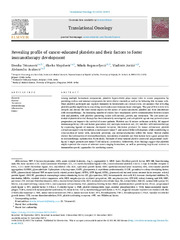Приказ основних података о документу
Revealing profile of cancer-educated platelets and their factors to foster immunotherapy development
| dc.creator | Trivanović, Drenka | |
| dc.creator | Mojsilović, Slavko | |
| dc.creator | Bogosavljević, Nikola | |
| dc.creator | Jurišić, Vladimir | |
| dc.creator | Jauković, Aleksandra | |
| dc.date.accessioned | 2024-02-20T12:18:50Z | |
| dc.date.available | 2024-02-20T12:18:50Z | |
| dc.date.issued | 2024 | |
| dc.identifier.isbn | 1936-5233 | |
| dc.identifier.uri | http://rimi.imi.bg.ac.rs/handle/123456789/1460 | |
| dc.description.abstract | Among multiple hemostasis components, platelets hyperactivity plays major roles in cancer progression by providing surface and internal components for intercellular crosstalk as well as by behaving like immune cells. Since platelets participate and regulate immunity in homeostatic and disease states, we assumed that revealing platelets profile might help in conceiving novel anti-cancer immune-based strategies. The goal of this review is to compile and discuss the most recent reports on the nature of cancer-associated platelets and their interference with immunotherapy. An increasing number of studies have emphasized active communication between cancer cells and platelets, with platelets promoting cancer cell survival, growth, and metastasis. The anti-cancer potential of platelet-directed therapy has been intensively investigated, and anti-platelet agents may prevent cancer progression and improve the survival of cancer patients. Platelets can (i) reduce antitumor activity; (ii) support immunoregulatory cells and factors generation; (iii) underpin metastasis and, (iv) interfere with immunotherapy by expressing ligands of immune checkpoint receptors. Mediators produced by tumor cell-induced platelet activation support vein thrombosis, constrain anti-tumor T- and natural killer cell response, while contributing to extravasation of tumor cells, metastatic potential, and neovascularization within the tumor. Recent studies showed that attenuation of immunothrombosis, modulation of platelets and their factors have a good perspective in immunotherapy optimization. Particularly, blockade of intra-tumoral platelet-associated programmed death-ligand 1 might promote anti-tumor T cell-induced cytotoxicity. Collectively, these findings suggest that platelets might represent the source of relevant cancer staging biomarkers, as well as promising targets and carriers in immunotherapeutic approaches for combating cancer. | |
| dc.publisher | Neoplasia Press, Inc. | |
| dc.relation | info:eu-repo/grantAgreement/MESTD/inst-2020/200015/RS// | |
| dc.relation | info:eu-repo/grantAgreement/MESTD/inst-2020/200111/RS// | |
| dc.rights | openAccess | |
| dc.rights.uri | https://creativecommons.org/licenses/by-nc-nd/4.0/ | |
| dc.source | Translational Oncology | |
| dc.source | Translational OncologyTranslational Oncology | |
| dc.subject | Platelets | |
| dc.subject | Thrombosis | |
| dc.subject | Immunotherapy | |
| dc.subject | Inflammation | |
| dc.subject | Cancer | |
| dc.title | Revealing profile of cancer-educated platelets and their factors to foster immunotherapy development | |
| dc.type | article | en |
| dc.rights.license | BY-NC-ND | |
| dc.citation.spage | 101871 | |
| dc.citation.volume | 40 | |
| dc.identifier.doi | 10.1016/j.tranon.2023.101871 | |
| dc.identifier.fulltext | http://rimi.imi.bg.ac.rs/bitstream/id/3444/Revealing_profile_of_cancer_pub_2024.pdf | |
| dc.type.version | publishedVersion |

